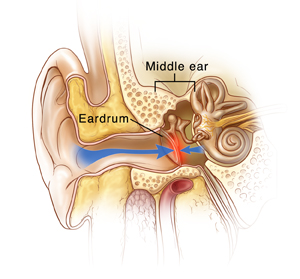Ear Barotrauma

Ear barotrauma is an injury to the soft tissues of the middle ear and eardrum. It happens when unequal pressures form inside the middle ear and outside the eardrum. This often happens with altitude or pressure changes, such as during an airplane flight or scuba diving. It can also occur after a blow to the head. If you already have congestion from a cold or allergies, barotrauma is more likely to occur.
Symptoms include pressure and pain in the ears. You may feel dizzy. Your ears may feel plugged. You may also have short-term hearing loss. In severe cases, the eardrum may rupture. This can lead to bleeding and infection.
Often, self-care is all that is needed to relieve symptoms. Even a ruptured eardrum will most likely heal on its own. If it does not, surgery may be needed to repair it. In this case, you’ll be sent to a specialist for further care.
Home care
You may use over-the-counter pain medicine unless another pain medicine is prescribed. Talk with your doctor before using these medicines if:
-
You have chronic liver or kidney disease.
-
You take other medicines, especially blood-thinners.
-
You've ever had a stomach ulcer or gastrointestinal bleeding.
If your doctor doesn't prescribe oral or nasal decongestants and antihistamines to help ease congestion, you might try over-the-counter medicines.
To help prevent or treat an ear infection, your doctor may prescribe antibiotics. Take them as directed. Do not stop taking them just because you feel better. You need to take the full course of antibiotics.
Prevention
-
Each ear has an eustachian tube, which connects the middle ear to the back of the throat. Certain self-care steps can help keep the eustachian tubes open and relieve pressure in the middle ear. They include:
-
Nose, sinus, or ear congestion makes barotrauma more likely. Use caution if you have a cold, infection, or allergies. If you have any of these and need to fly, taking an antihistamine and decongestant 1 to 2 hours before flying may help. These medicines are available over the counter as both pills and nasal sprays. Ask your doctor which of these medicines is safe for you.
-
When flying, don't sleep during the descent. Use the self-care steps listed above to help open the eustachian tubes.
-
When scuba diving, descend and ascend slowly. Diving when you have any sinus, ear, or nasal congestion is not recommended.
Follow-up care
Follow up with your doctor, or as advised.
When to contact your doctor
Contact your doctor right away if:
-
You have a fever of 100.4°F (38°C) or higher, or as directed by your doctor.
-
You have more pain or ringing in your ears.
-
You have hearing loss that gets worse or lasts longer than 2 days.
-
Fluid or blood is draining from the ear.
-
You feel dizzy.